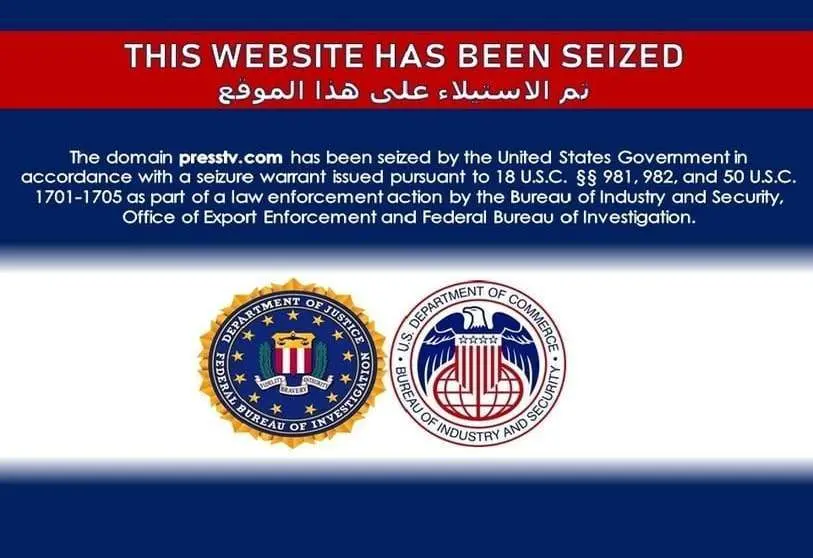US blocks access to several websites linked to Iran

The United States and Iran are two countries that are completely antagonistic but doomed to understand each other, or at least try to, always taking into account their clear differences. The relationship between the two countries is in a complex moment; both countries are determined to recover the 2015 nuclear pact, but their multiple discrepancies make it impossible to reach a definitive agreement.
Nor have the recent elections in Iran facilitated a good understanding between the two nations. Iran has returned to the path of ultraconservatism, with Ebrahim Raisi elected as the new president of the Persian country. The US has described the elections as neither "free nor fair", overshadowed by a low turnout of just 49%, which has cast doubt on their legitimacy.

In a turn of events that could further strain relations between the US and Iran at a decisive moment for the nuclear negotiations, the US Department of Justice has blocked access to 36 Iranian websites that it accuses of disinformation or of collaborating with the Kataeb Hezbollah organisation, designated as a terrorist group by Washington.
Among the websites that have been "confiscated" are Press TV and Al-Alam, which make up the country's main English and Arabic-language broadcasters, as well as the Yemeni Houthi Al-Masirah television channel. Not only have websites related to the Islamic Republic been blocked, but the Justice Department has also blocked the news portal Palestine Today, which is sympathetic to the ideology of Hamas and Islamic Jihad, as well as Bahrain's LuaLua TV, run by opposition groups and with offices in London and Beirut.

For its part, the US Department of Justice has explained in a statement that last October it had already removed nearly 100 websites linked to the Iranian Revolutionary Guard because they were carrying out a "global disinformation campaign" to influence US policy and promote Iranian propaganda around the world.
In this case, the institution accuses different companies of having violated Washington's sanctions on Tehran because their real owners, the Islamic Iranian Radio and Television Union (IRTVU) and Kataeb Hezbollah, did not obtain special licences to operate. IRTVU has been blacklisted under US sanctions, making it illegal for Americans, US companies and foreign or non-US companies with US subsidiaries to do business with them.

EThe news portal Press TV is now back in operation under the .ir domain and has denounced this move by the US authorities in what it considers to be a "coordinated action by the US government" and an attack on "freedom of expression".
The move comes just days after the election of the Islamic Republic's new ultra-conservative president, Ebrahim Raísi, who during his first press conference on Monday showed a harsher attitude towards the West than his predecessor, Hassan Rohaní. During his speech he blamed the United States and the European Union for "violating and breaching" the 2015 nuclear deal and demanded the lifting of sanctions against Iran. He also said that Iran's ballistic missile programme is non-negotiable.

The blocking of more than 30 websites related to the Islamic Republic may lead to a further rift between the two countries and affect, above all, the negotiations on the return to the Joint Comprehensive Plan of Action (JCPOA) or as the 2015 nuclear deal is commonly known. Six rounds of negotiations have already taken place in the Austrian capital of Vienna. The latest round, which took place two days after the Iranian elections, was viewed positively by most of the negotiators stationed in the European capital.
Iranian President-elect Ebrahim Raisi, during his first press conference, said he was in favour of continuing the negotiations for a return to the 2015 nuclear pact, but established some red lines, such as the lifting of sanctions by the West. "The United States has to lift all oppressive sanctions against the Iranian people and then Iran will verify it," Raisi said, denouncing that Washington "violated the JCPOA and the Europeans did not keep their promises either".

He also said that Iran's foreign policy would not be limited to the nuclear deal. "The foreign policy of our Government will not start and will not be limited to the nuclear deal. We will seek broad and balanced interaction with all countries of the world," said Raisi, who opened the door to reconciliation with Saudi Arabia, Iran's main rival in the region. As for relations with the United States, no major changes are foreseen. When asked whether he would consider meeting with US President Joe Biden if he lifted sanctions and returned to the nuclear deal, the Iranian president-elect responded with a categorical "no".
Days after these declarations by Iran's new president, who will be sworn in on 3 August, the United States has blocked access to different websites linked to the Islamic Republic, a fact that presages a possible confrontation between the two countries that will take place in cyberspace.








